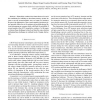Free Online Productivity Tools
i2Speak
i2Symbol
i2OCR
iTex2Img
iWeb2Print
iWeb2Shot
i2Type
iPdf2Split
iPdf2Merge
i2Bopomofo
i2Arabic
i2Style
i2Image
i2PDF
iLatex2Rtf
Sci2ools
ASPDAC
2015
ACM
2015
ACM
Toward large-scale access-transistor-free memristive crossbars
Abstract— Memristive crossbars have been shown to be excellent candidates for building an ultra-dense memory system because a per-cell access-transistor may no longer be necessary. However, the elimination of the access-transistor introduces several parasitic effects due to the existence of partially-selected devices during memory accesses, which could limit the scalability of access-transistor-free (ATF) memristive crossbars. In this paper we discuss these challenges in detail and describe some solutions addressing these challenges at multiple levels of design abstraction.
ASPDAC 2015 | Hardware |
| Added | 16 Apr 2016 |
| Updated | 16 Apr 2016 |
| Type | Journal |
| Year | 2015 |
| Where | ASPDAC |
| Authors | Amirali Ghofrani, Miguel Angel Lastras-Montaño, Kwang-Ting Cheng |
Comments (0)

